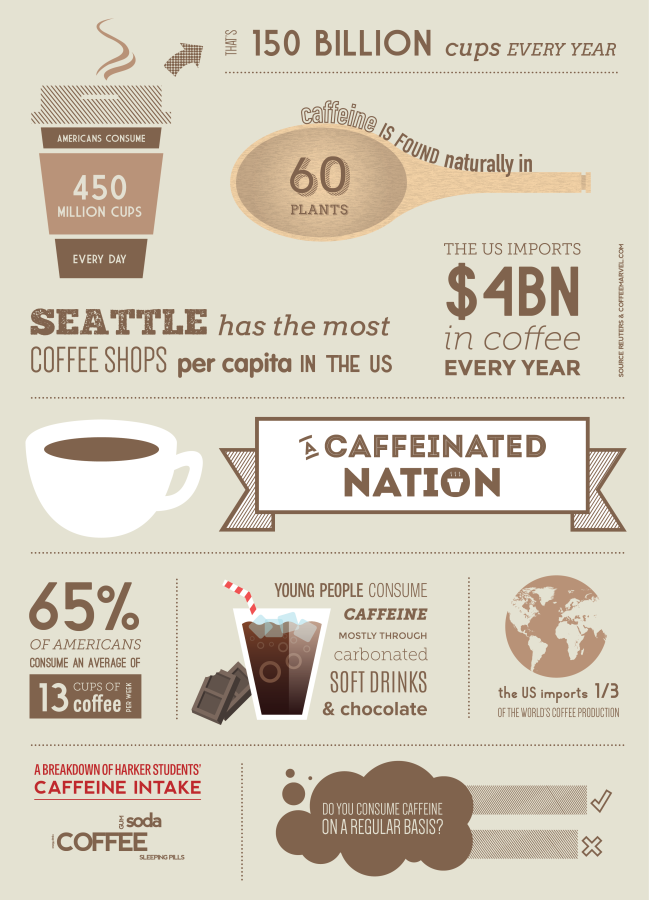The Caffeinated Nation
Energy shots, sodas, energy drinks, and that black liquid that runs this country- coffee. Caffeine dominates the nation.
The average American consumes as much as two to four cups of coffee a day worth of caffeine, and 90 percent of the adult population already ingests caffeine on a daily basis.
Although a recent Boston University study shows consumption of sodas by teenagers is down, the consumption of coffee and energy drinks have spiked among teenagers and children.
54.79% of Harker students drink caffeine on a regular basis, majority of whom (67.44%) consume it through a coffee or coffee-related beverage. 13.95% prefer sodas.
The number of teenagers drinking caffeinated beverages has tripled since the 1970’s. According to the health journal, Pediatrics, nearly 75% of American children and teenagers (ages five and up) consume caffeine. Most minors get their fix through sodas, but the popularity of highly caffeinated energy drinks and coffee is on the rise.
A drug found in various plants, caffeine, stimulates the central nervous system, heart and , muscles. In some users, caffeine may lead to high blood pressure. Currently, the FDA does not have any specific recommendations for maximum caffeine intake.
“Caffeine acts as a stimulant by inhibiting the binding of adenosine to its receptors on the neurons meant to receive those signals in the brain; caffeine and adenosine have similar structures. Normally, the binding of adenosine would depress neuronal function, making us drowsy among other effects,” said biology teacher Dr. Harley. “Therefore, people feel more alert with caffeine in their system.”
Biology teacher Mike Pistacchi expressed his concerns about the true nature of caffeine. “[Caffeine] can be acutely poisonous to humans if ingested in large amounts. The nice stimulant effect you get from coffee is actually the coffee plant trying to kill you for eating its seeds,” he said, “That being said it is generally safe to ingest lower-concentration sources like coffee and tea in reasonable amounts but the current trend is to heavily concentrate caffeine in energy drinks and concentrated caffeine powder supplements being sold at ‘nutrition’ stores like GNC.”
As stated in a Health News article, moderate amounts can help a student concentrate, sharpen their thoughts, and temporarily improve coordination while keeping the student energized throughout a long day. Japanese researchers have also found that caffeine can help memory performance.. Unfortunately, there is a down to caffeine’s high; too much can lead to agitation, anxiety, shakiness, and even more severe consequences like rapid heart rate.
While a little caffeine here and there won’t leave a lasting impact on a teenager’s health, consistent use has negative consequences. Caffeine is most noted for interfering with sleep and appetite, preventing adolescents from obtaining the necessary nutrients needed to develop into healthy, fully functioning adults.
Yale professor and caffeine expert Dr. Kelly Cosgrove commented on an article she wrote with colleagues. “Kids’ brains are developing and they continue to develop throughout their teenage years, so you just want to be careful about how you treat your brain. Exposing yourself to any drugs, of which caffeine is one, could have some negative effects. It’s important to recognize how much caffeine you are drinking – and what you are drinking it with. And if you realize you are drinking too much, then you should take some steps to cut back and replace it with healthier alternatives.”
This piece was originally published in the pages of The Winged Post on August 29, 2014.

Kaity Gee (12) is the assistant Editor in Chief of Wingspan. Serving as a reporter for TALONWP freshman year, Kaity has written pieces for Winged Post...

Shay Lari-Hosain (12) is the Editor-in-Chief and co-founder of Wingspan Magazine. Shay has interviewed 2013 Nobel Laureates, authors like Khaled Hosseini...


















![“[Building nerf blasters] became this outlet of creativity for me that hasn't been matched by anything else. The process [of] making a build complete to your desire is such a painstakingly difficult process, but I've had to learn from [the skills needed from] soldering to proper painting. There's so many different options for everything, if you think about it, it exists. The best part is [that] if it doesn't exist, you can build it yourself," Ishaan Parate said.](https://harkeraquila.com/wp-content/uploads/2022/08/DSC_8149-900x604.jpg)




![“When I came into high school, I was ready to be a follower. But DECA was a game changer for me. It helped me overcome my fear of public speaking, and it's played such a major role in who I've become today. To be able to successfully lead a chapter of 150 students, an officer team and be one of the upperclassmen I once really admired is something I'm [really] proud of,” Anvitha Tummala ('21) said.](https://harkeraquila.com/wp-content/uploads/2021/07/Screen-Shot-2021-07-25-at-9.50.05-AM-900x594.png)







![“I think getting up in the morning and having a sense of purpose [is exciting]. I think without a certain amount of drive, life is kind of obsolete and mundane, and I think having that every single day is what makes each day unique and kind of makes life exciting,” Neymika Jain (12) said.](https://harkeraquila.com/wp-content/uploads/2017/06/Screen-Shot-2017-06-03-at-4.54.16-PM.png)








![“My slogan is ‘slow feet, don’t eat, and I’m hungry.’ You need to run fast to get where you are–you aren't going to get those championships if you aren't fast,” Angel Cervantes (12) said. “I want to do well in school on my tests and in track and win championships for my team. I live by that, [and] I can do that anywhere: in the classroom or on the field.”](https://harkeraquila.com/wp-content/uploads/2018/06/DSC5146-900x601.jpg)
![“[Volleyball has] taught me how to fall correctly, and another thing it taught is that you don’t have to be the best at something to be good at it. If you just hit the ball in a smart way, then it still scores points and you’re good at it. You could be a background player and still make a much bigger impact on the team than you would think,” Anya Gert (’20) said.](https://harkeraquila.com/wp-content/uploads/2020/06/AnnaGert_JinTuan_HoHPhotoEdited-600x900.jpeg)

![“I'm not nearly there yet, but [my confidence has] definitely been getting better since I was pretty shy and timid coming into Harker my freshman year. I know that there's a lot of people that are really confident in what they do, and I really admire them. Everyone's so driven and that has really pushed me to kind of try to find my own place in high school and be more confident,” Alyssa Huang (’20) said.](https://harkeraquila.com/wp-content/uploads/2020/06/AlyssaHuang_EmilyChen_HoHPhoto-900x749.jpeg)



